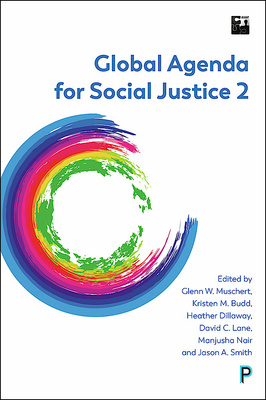This Pride Month, Madelaine Adelman and Eliza Byard, contributors to the Global Agenda for Social Justice, out later this year, look at the global safe school movement which protects LGBTQ+ youth.
A troubling rise in anti-LGBTQ rhetoric and legislation in states around the globe can be traced to ‘spin dictators’ and their supporters, who scapegoat sexual minority and gender diverse youth while purporting to protect them.
Such targeting of LGBTQ+ youth is a calculated counter to the global movement for ‘safe schools’ which, through a combination of research and advocacy, has led intergovernmental organizations, such as the UN, to encourage states to acknowledge and protect LGBTQ+ youth.
Following the lead of sexual and gender minority youth who have begun to demand safety and dignity around the world, the global safe schools movement is an informal network of nongovernmental organizations (NGOs) active on nearly every continent. It is concerned with the prevalence and effects of bias-based violence and discrimination against primary and secondary school students who do not conform to socially dominant or expected sexuality and gender norms. The transnational movement is united by two shared goals: to document LGBTQ+ youth experiences through research; and to promote affirming school climates through advocacy. Notably, the UN incorporated LGBTQ+ safety and equality into its Agenda 2030 plan for achieving global peace and prosperity.
However, visibility and victories have resulted in the greater availability of anti-LGBTQ+ tropes for use as political fodder by bad-faith actors seeking to undermine progress toward the rights of LGBTQ+ youth, particularly, and democratic values, more generally. Today, anti-LGBTQ animus is harnessed by moral-panic-inducing right-wing autocrats from Russia to Brazil to the United States.
Hungary’s Prime Minister Viktor Orbán has made anti-LGBTQ sentiments central to his political campaigns and nationalist vision. Among other efforts, in 2018, the government attacked what transnational conservatives call ‘gender ideology’ through decree No. 188/2018 (X.12), which banned Gender Studies in higher education in Hungary. Central European University in Budapest housed one of the two programs affected by the decree. In June 2021 the National Assembly passed legislation that “outlaws sharing information with under-18s that the government considers to be promoting homosexuality or gender change.” Orbán was re-elected in 2022 to his fourth consecutive term with an anti-LGBTQ referendum on the ballot. A month later, he delivered the keynote address at the Conservative Political Action Conference (CPAC) held in Budapest, where Orbán outlined to his ‘Dear American Friends’ a twelve-point plan, including the need to expose “the issue of LGBTQ propaganda targeting children,” to establish a “conservative, Christian government”.
Antidemocratic antagonism targeting LGBTQ+ youth has multiplied exponentially in Hungary and elsewhere, resulting in violence and legalised discrimination, and the branding of LGBTQ+ people as second-class citizens, if not disloyal outsiders. In the US, following their failure to halt marriage equality, right-wing groups, such as Alliance Defending Freedom, have sought the legal erasure of trans youth. State legislators want transgender youth to participate in physical education and sport based on their “sex assigned at birth” rather than their gender identity, while also barring trans youth from obtaining gender-affirming healthcare. Endorsed by Trump through his federal Departments of Justice and Education, these anti-trans debates and policies have caused deep health and education disparities among US youth. As Masha Gessen argued upon the election of Donald Trump, a central part of right-wing electoral campaigns and subsequent political regimes is the “promise of a return to an imaginary past” and “[w]ith few exceptions, countries that have grown less democratic in recent years have drawn a battle line on the issue of LGBT rights”.
In the face of backlash against LGBTQ+ youth promulgated in the name of ‘protecting children’, stakeholders of all ages and at all levels – local school communities, civil society actors, national governments, and multilateral organizations – have roles to play in defending and extending progress on state and global goals for youth development and education. In short, the social problem of anti-LGBTQ+ bias in school communities still needs to be addressed, while the backlash aimed at restoring the status quo ante needs to be unpacked and de-weaponised.
Demonizing one group of people (any group) reveals the vulnerability of democratic institutions, such that mutually reinforcing efforts are required to prop them up. Identity-based movements are critical but insufficient without attention to the other forms of structural inequalities. In other words, fighting for LGBTQ+ rights in schools can address environmental justice and sustainability concerns, along with poverty and economic inequality, while fighting for sustainable development can address LGBTQ+ rights in schools. However, the relationships must be articulated explicitly and be set in motion to work in concert with each other by researchers and advocates alike.
Madelaine Adelman is Professor of Justice and Social Inquiry in the School of Social Transformation at Arizona State University,
Eliza Byard is a leading global expert on LGBTQ+ issues in education, and a strategist for movement building and mobilization at the local, national, and international level. She currently serves as Senior Advisor to the Campaign for Our Shared Future.
 Global Agenda for Social Justice 2 edited by Glenn W. Muschert, Kristen M. Budd, Heather Dillaway, David C. Lane, Manjusha Nair and Jason A. Smith is available on the Policy Press website. Order here for £14.99.
Global Agenda for Social Justice 2 edited by Glenn W. Muschert, Kristen M. Budd, Heather Dillaway, David C. Lane, Manjusha Nair and Jason A. Smith is available on the Policy Press website. Order here for £14.99.
Bristol University Press/Policy Press newsletter subscribers receive a 25% discount on all books – sign up here.
Follow Transforming Society so we can let you know when new articles publish.
The views and opinions expressed on this blog site are solely those of the original blog post authors and other contributors. These views and opinions do not necessarily represent those of the Policy Press and/or any/all contributors to this site.
Image credit: Jim West / Alamy Stock Photo


